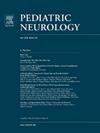Investigating the Association Between Infantile Colic and Parental Migraine
IF 2.1
3区 医学
Q2 CLINICAL NEUROLOGY
引用次数: 0
Abstract
Background
To estimate the prevalence of infantile colic and determine its associated factors. Previous studies demonstrate that maternal migraine is significantly associated with increased odds of infantile colic. However, paternal migraine is not significantly associated with infantile colic.
Methods
We conducted a cross-sectional study of infants and parents. We surveyed all parents who brought healthy babies aged ≥3 months to our clinic. We determined the association of infantile colic with the following: child being the first- or nonfirst-born, breastfed or mixed- or formula-fed, sleeping without family or with family, and the mother and father having a history of migraine without or with aura. Odds ratios (ORs) and 95% confidence intervals were reported.
Results
We included 352 babies (174 girls and 178 boys). Of these, 15 babies (4.3%; 7 girls and 8 boys) were diagnosed with infantile colic based on the International Classification of Headache Disorders criteria. The prevalence of infantile colic among the children of fathers with a history of migraine without aura (12.8%) (P = 0.027) was significantly higher than that among the children of fathers who did not have a history of migraine (3.5%). Maternal migraine without aura was significantly associated with increased odds of infantile colic (OR: 3.23 [1.03-10.14]). Paternal migraine without aura was significantly associated with increased odds of infantile colic (OR: 4.08 [1.26-13.2]).
Conclusions
In this study, both maternal and paternal migraines without aura were associated with increased odds of infantile colic, suggesting a genetic influence.
调查婴儿绞痛与父母偏头痛的关系
背景:评估婴儿绞痛的患病率并确定其相关因素。先前的研究表明,母亲偏头痛与婴儿绞痛的几率显著增加有关。然而,父亲偏头痛与婴儿绞痛没有显著的关系。方法对婴儿和父母进行横断面研究。我们调查了所有带3个月以上健康婴儿来我们诊所的父母。我们确定了婴儿绞痛与以下因素的关系:孩子是头胎或非头胎,母乳喂养或混合或配方奶喂养,没有家人或与家人一起睡觉,母亲和父亲有偏头痛病史,没有或有先兆。报告了优势比(ORs)和95%置信区间。结果共纳入352例婴儿,其中女174例,男178例。其中,15名婴儿(4.3%;根据国际头痛疾病分类标准,7名女孩和8名男孩被诊断为婴儿绞痛。父亲有无先兆偏头痛病史的子女的婴儿绞痛患病率(12.8%)(P = 0.027)显著高于父亲无偏头痛病史的子女(3.5%)。无先兆的孕妇偏头痛与婴儿绞痛的几率增加显著相关(OR: 3.23[1.03-10.14])。父亲无先兆偏头痛与婴儿绞痛几率增加显著相关(OR: 4.08[1.26-13.2])。结论在本研究中,母亲和父亲的无先兆偏头痛与婴儿绞痛的几率增加有关,提示遗传影响。
本文章由计算机程序翻译,如有差异,请以英文原文为准。
求助全文
约1分钟内获得全文
求助全文
来源期刊

Pediatric neurology
医学-临床神经学
CiteScore
4.80
自引率
2.60%
发文量
176
审稿时长
78 days
期刊介绍:
Pediatric Neurology publishes timely peer-reviewed clinical and research articles covering all aspects of the developing nervous system.
Pediatric Neurology features up-to-the-minute publication of the latest advances in the diagnosis, management, and treatment of pediatric neurologic disorders. The journal''s editor, E. Steve Roach, in conjunction with the team of Associate Editors, heads an internationally recognized editorial board, ensuring the most authoritative and extensive coverage of the field. Among the topics covered are: epilepsy, mitochondrial diseases, congenital malformations, chromosomopathies, peripheral neuropathies, perinatal and childhood stroke, cerebral palsy, as well as other diseases affecting the developing nervous system.
 求助内容:
求助内容: 应助结果提醒方式:
应助结果提醒方式:


